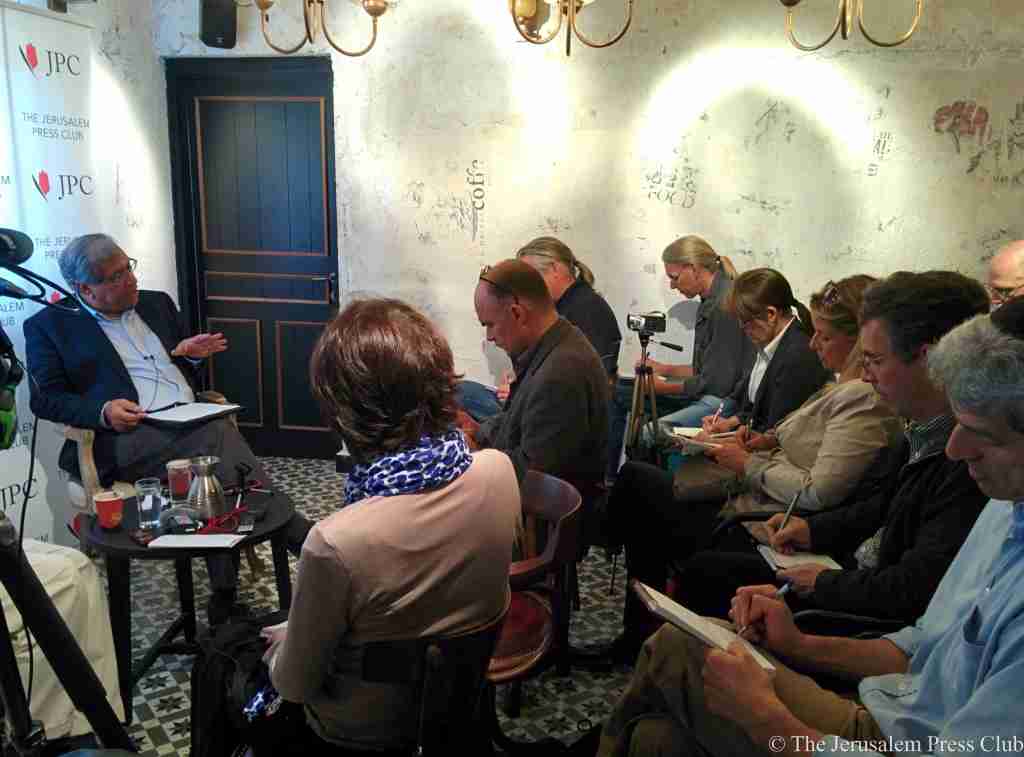On Tuesday, April 1, 2014, in a perfect timing, just as the peace talks between Israelis and Palestinians entered their most fragile phase, JPC hosted Dr. Khalil Shikaki,Director of the Palestinian Center for Policy and Survey Research (Ramallah). Dr Shikaki, who has been conducting public opinion polls among Palestinians for a long time, shared with his audience the current Palestinian Attitudes towards the Peace Process.
Attached you will find the crux of his findings.

Khalil Shikaki is a Professor of Political Science and director of the Palestinian Center for Policy and Survey Research (Ramallah). Since 2005 he has been a senior fellow at the Crown Center for Middle East Studies at Brandeis University. He finished his Ph.D. in Political Science from Columbia University in 1985, and taught at several Palestinian and American universities. Between 1996-99, Dr. Shikaki served as Dean of Scientific Research at al Najah University in Nablus. He spent summer 2002 as a visiting fellow at the Brookings Institution in Washington DC. Since 1993, Dr. Shikaki has conducted more than 200 polls among Palestinians in the West Bank and the Gaza Strip and, since 2000, dozens of joint polls among Palestinians and Israelis.
Between 1998-99, jointly with Dr. Yezid Sayigh, Dr. Shikaki led a group of more than 25 Palestinian and foreign experts on Palestinian institution building. The findings of the group were published in a Council on Foreign Relations’ report, Strengthening Palestinian Public Institutions (New York: Council on Foreign Relations, 1999). Shikaki and Sayigh were the principal authors of the report. Since 1999, Dr. Shikaki has continued to work with the sponsors of the report, the Independent Task Force on Strengthening Palestinian Public Institutions, under the leadership of Michel Rocard and Henry Siegman, advising them on Palestinian reform and annually updating the 1999 report. The latest update covered the period up to April 2006.
Dr. Shikaki’s research has focused on the peace process, Palestinian state building, public opinion, transition to democracy, and the impact of domestic Palestinian politics on the peace process. He is the co-author of the annual report of the Arab Democracy Index and a member of the Steering Committee of the Arab Barometer, two initiatives led by the Arab Reform Initiative. His recent publications include “The future of Israel-Palestine: a one-state reality in the making,” NOREF Report, May 2012; “Coping with the Arab Spring; Palestinian Domestic and Regional Ramifications, ” Middle East Brief, no. 58, Crown Center for Middle East Policy, Brandeis University, December 2011; Public Opinion in the Israeli-Palestinian Conflict: The Public Imperative During the Second Intifada, with Yaacov Shamir, Indiana University Press, 2010; and “Palestine 1993-2006: Failed Peacebuilding, Insecurity and Poor Governance,” in Stephen Baranyi (ed.) The Paradoxes of Peacebuilding Post-9/11(Vancouver, Canada: UBC Press, 2008).
– To read articles published following this event, please visit our Media section.

